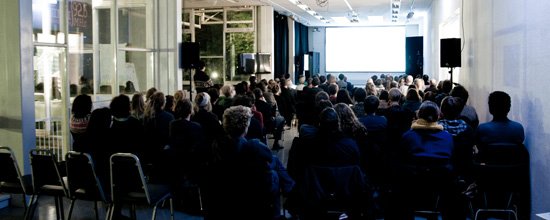Day Five: Review – Media and Communication
Tuesday,25 Oct 11 20:28
Interesting discussions in a crowded Forum Stadtpark
The internet is an essential part of the 21st century’s development. It enables us to access information, to communicate over long distances and keeps human beings flexible and available at any time. However, we are always being observed when we are online. Anonymity gets lost – information that exists in the digital world can never be deleted again. It is always available for advertising-companies as well as for big companies and governments.
Decentralized networks, which were discussed on day five, offer an alternative. Erich Moechel, Austrian journalist and author, uses a radio network to communicate with some other amateur radio operators. This network is independent from the infrastructure needed for telephone or mobile-communication. Besides that, Michael Bauer and Christian Pointner are trying to establish the project “funkfeuer” in Graz and Vienna. “funkfeuer” shall provide free internet access for everybody.
James Vasile promised “Freedom, out of the Box!”. With a small plug-in server, not bigger than an external drive, he offers coded telephoning, file sharing, micro blogging-tools, social networks like Diaspora or a special mail server based on Debian Linux (a free software). It protects privacy and makes data-access impossible for persons who should not have access. In countries where oppression and human rights cause problems, secure communication should be supported in particular.
Well known sharing-platforms have many advantages, but they are also risky in points of data protection. Christian Payne is a well known blogger and social media activist. He’s known as @documentally in the UK. He loves the speed and scope of delivering digital information. However, Max Schrems, who has accused Facebook for sharing personal data, critizises that. A PDF file with more than 2.000 pages documents his activities on facebook. It includes private messages as well as deleted comments and even his activities on pages linked to facebook (for instance via Like-Button). There are many alternatives to using these mainstream-platforms (Diaspora, status.net and many more) – unfortunately they cannot reach a bigger user-community. Thus, it was suggested that the internet-community should support such providers and fight for data protection.
To put this in a wider context, there also was a discussion about communication>democracy?. Communication via web should have brought more freedom, broaden people’s horizons and their opportunities. Now it seems that humans became a product during this development; a package of information that can be sold and bought by companies. However, there are alternatives to resist and build a new way of usage for future.
A shockingly realistic vision of the future that was born in the 1990ies was shown later within the film „We Live in Public“. Ondi Timoner presented a portrait of Josh Harris who supported projects related to surveillance. Although his name is not that famous, he is one of the pioneers of the internet-development. After the screening, Timoner answered visitors’ questions via live-video stream.
More information about the program, interviews and photos you can find here.